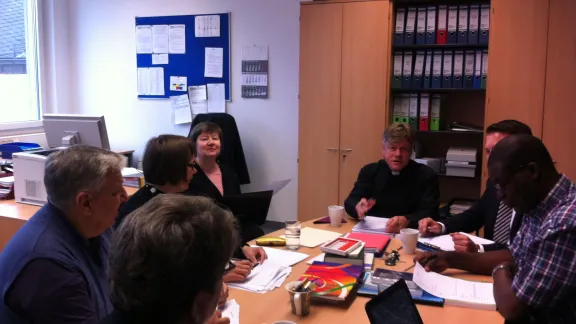
Members of the LWF-PCPCU liturgical working group at their first meeting in Würzburg, Germany. LWF/A. Burghardt
Joint Working Group Begins Preparations for 2017 Liturgical Material
(LWI) Lutheran and Roman Catholic liturgists are a step closer to making available worship materials for joint ecumenical commemorations of the 2017 Reformation anniversary.
An eight-person liturgical working group of The Lutheran World Federation (LWF) and the Vatican’s Pontifical Council for Promoting Christian Unity (PCPCU), held its first meeting, 28-31 May, in Würzburg, Germany. The group includes four members from each organization, with Rev. Anne Burghardt and Monsignor Dr Matthias Türk as a co-secretaries for the LWF and the Vatican respectively.
The group is charged with creating worship materials that would help the two Christian traditions to commemorate together the 500th Reformation anniversary, which coincides with the 50th anniversary of the Lutheran-Roman Catholic dialogue.
The inaugural meeting preceded the launch of the report, “From Conflict to Communion” by the Lutheran-Roman Catholic Commission on Unity at the 13-18 June LWF Council meeting in Geneva. The publication marks the first time that Lutherans and Catholics are jointly telling the history of the Reformation. The LWF governing body also approved the report of the LWF Special Committee on “Luther 2017 – 500 years of the Reformation,” which proposes values and principles on how to mark the Reformation anniversary, and mentions practical details of processes that are already underway in the Lutheran communion. The LWF will mainly concentrate its activities on the three years from 2015 to 2017. (See related stories and reports on the LWF Council page at www.lutheranworld.org)
In Würzburg the members of the working group agreed on a broad structure for ecumenical worship services, and also identified some principal readings from the Bible.
The worship materials being prepared are intended to offer suggestions for joint commemorations at the global and local levels, said Burghardt, LWF study secretary for ecumenical relations.
“The LWF has declared that the 500th anniversary of the Reformation should be ecumenically accountable. As the year 2017 does not only mark this anniversary but also 50 years of the Lutheran-Catholic dialogue, there is good reason for holding joint worship services between Lutherans and Catholics,” she emphasized.
“The worship materials being prepared for Lutherans and Catholics to use together in 2017 will express joy over the fruits of decades of ecumenical discussion in the search for Christian unity, as well as recognition that through baptism both Lutherans and Catholics have received Christ`s call and are called to common witness in the world,” Burghardt noted.
“Still, repentance should also have its place in the worship to express pain over a divided church, and regret that the churches have not always remained true to their baptismal calling,” she added.
The working group will hold its next meeting in December in Tallinn, Estonia. The goal is to have the proposed ecumenical liturgical materials ready by the end of 2014.


